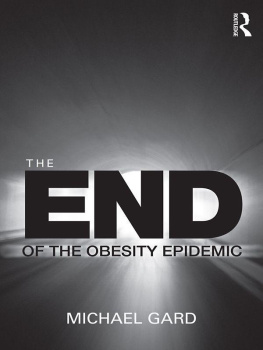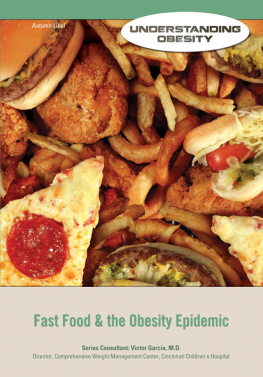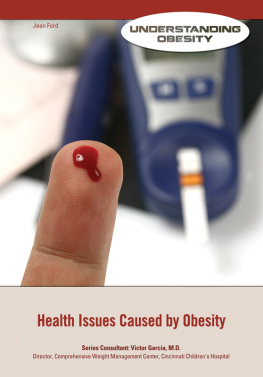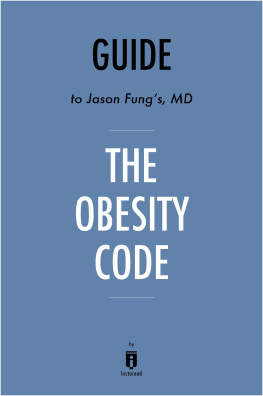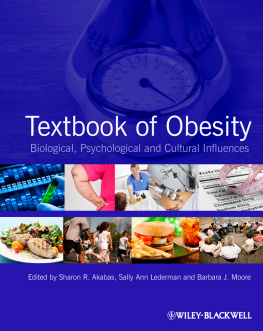The End of the Obesity Epidemic
Despite apocalyptic predictions from a vocal alliance of health professionals, politicians and social commentators that rising obesity levels would lead to a global health crisis, the crisis has not materialised. In this provocative follow-up to his classic work of obesity scepticism, The Obesity Epidemic, Michael Gard argues that we have entered into a new, and perhaps terminal, phase of the obesity debate.
Evidence suggests that obesity rates are levelling off in Western societies, life expectancies continue to rise in line with rising obesity rates, and across the world policy-makers have remained largely indifferent and inactive in the face of this apparently deadly threat to our health and well-being. Dissecting and dismissing much of the over-blown rhetoric and ideological bias found on both sides of the obesity debate, Gard demonstrates that the science of obesity remains radically uncertain and that it is impossible to establish an objective truth on which to base policy. His powerful and inescapable conclusion is that we should now mark the end of the obesity epidemic.
Offering a road map through the maze of claims and counter-claims, while still holding to a sceptical standpoint, this book provides an unparalleled anatomy of obesity as a scientific, political and cultural issue. It is essential reading for anybody with an interest in the science or sociology of health and lifestyle.
Michael Gard is Associate Professor in the Faculty of Education at Charles Sturt Universitys Bathurst campus. He teaches and writes about health, physical education, sport and the media and is a regular media commentator on these topics. His previous work in this field includes his book The Obesity Epidemic: Science, Morality and Ideology, co-written with Jan Wright.
The End of the Obesity Epidemic
Michael Gard

LONDON AND NEW YORK
First published 2011
by Routledge
2 Park Square, Milton Park, Abingdon, Oxon, OX14 4RN
Simultaneously published in the USA and Canada
by Routledge
270 Madison Avenue, New York, NY 10016
Routledge is an imprint of the Taylor & Francis Group, an informa business
This edition published in the Taylor & Francis e-Library, 2011.
To purchase your own copy of this or any of Taylor & Francis or Routledges collection of thousands of eBooks please go to www.eBookstore.tandf.co.uk.
2011 Michael Gard
The right of Michael Gard to be identified as author of this work has been asserted by him in accordance with sections 77 and 78 of the Copyright, Designs and Patents Act 1988.
All rights reserved. No part of this book may be reprinted or reproduced or utilised in any form or by any electronic, mechanical, or other means, now known or hereafter invented, including photocopying and recording, or in any information storage or retrieval system, without permission in writing from the publishers.
British Library Cataloguing in Publication Data
A catalogue record for this book is available from the British Library
Library of Congress Cataloging-in-Publication Data
Gard, Michael, 1965
The end of the obesity epidemic / by Michael Gard.
p.; cm.
1. ObesityEpidemiology. 2. ObesitySocial aspects. I. Title.
[DNLM: 1. Obesityepidemiology. 2. Obesitypsychology. WD 210 G217e 2011]
RA645.O23G366 2011
362.196'398dc22
2010018103
ISBN 0-203-88119-2 Master e-book ISBN
ISBN 13: 9780415489874 hbk
ISBN 13: 9780415489881 pbk
ISBN 13: 9780203881194 ebk
To Beverly Margaret Gard, my mother, whose bravery, toughness and beauty will live with me for ever.
Contents
With Carolyn Vander Schee
|
List of figures
3.1 | Trends in obesity by sex, adults aged twenty years and older, United States, 19992000 to 20052006 |
3.2 | Change in obesity prevalence during 19982003 and 20032008 among children aged two to four years, by race/ethnicity |
3.3 | Prevalence of overweight including obesity for Canadian adults |
3.4 | Prevalence of obesity for Canadian adults |
3.5 | Prevalence of overweight and obesity (classes IIII) in Canada, 19852003 |
3.6 | Overweight and obesity prevalence for English males and females aged sixteen to sixty-four years, 19932008 |
3.7 | Overweight and obesity prevalence for English children aged two to fifteen years by sex, 19952008 |
3.8 | Obesity prevalence trends from 1997 to 20022003 by income category and sex |
3.9 | Obesity prevalence trends from 1997 to 20022003 by income group and social class for boys and girls combined |
3.10 | Prevalence of obesity for boys and girls |
3.11 | Obesity prevalence for adults, by gender, 1997, 20022003 and 20062007 |
3.12 | Obesity prevalence for children aged five to fourteen years, by gender, 2002 and 20062007 |
3.13 | Lowess curves showing trends in the prevalence of obesity alone and overweight and obesity for boys and girls |
List of tables
3.1 | Body Mass Index prevalence for English adults aged sixteen to sixty-four years |
3.2 | Comparison of childhood overweight and obesity prevalence predictions for 2020 |
Acknowledgements
Small sections of this book, distributed across a number of chapters, were previously published in:
Gard, M. (2009) Friends, enemies and the cultural politics of critical obesity research, in: J. Wright and V. Harwood (eds) Biopolitics and the Obesity Epidemic: Governing Bodies, New York: Routledge: 3144.
Following the publication of The Obesity Epidemic: Science, Morality and Ideology, my co-author and I were ridiculed for not publishing our work in the mainstream medical journals. Apparently this was meant to cast doubt on the quality of our ideas. This was perhaps understandable but, still, a serious mistake, not least because my co-author was Jan Wright, a formidable researcher and thinker in any company. Although not an author here, Jan remains a friend and colleague and read large sections of this book while it was being written. Regardless of its final merits, it is a different and better book because of her advice.
I was also fortunate to have been able to correspond with Tim Olds during this project. Tim read and commented on of this book. Carolyn has been my collaborator and skipper on a number of obesity-related research projects, an intellectual ally and close friend.
This book was helped along by a few self-appointed though criminally underpaid research assistants, who cut out newspaper columns and dropped them in my pigeonhole or emailed me news stories and references. Foremost amongst these was my Charles Sturt University colleague Rylee Dionigi, another incurably generous spirit and cherished friend. Darren Powell from New Zealand also passed on some particularly useful material.
Other friends and colleagues listened patiently as I waffled on about the end of the obesity epidemic and offered their own intelligent comments and suggestions. They include Jo Morin, Sarah Howard, Lisette Burrows, Mark Falcous, John Evans, Emma Rich, Kirsten Bell and Alan Bain.

